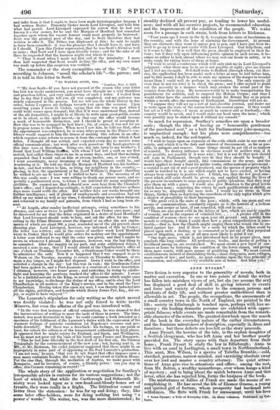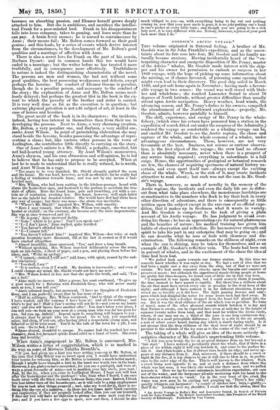ANNB DIrs-Ax.x. •
This fiction is very superior to the generality of novels, both in . matter and execution. In one or two points- of detail the writer has fallen into mistaken views, of art, but she (we assume the sex) has displayed a good deal of skill in giving interest to events and force and variety of character to the common persons and incidents of daily life, and without greater unlikelihood than is allowable in art. The people, the occupations, the amusements of a small country town in the North of England, are painted to the life ; society in Edinburgh is touched upon, perhaps with less ac- curacy • the leading dramatis personae are exhibited with appro- priate fulness; while events are made remarkable from the remark- able character of the actors. The greatest drawback upon the march of the book is the everyday 'nature of the earlier circumstances, and the feminine minuteness of description, especially in dress and furniture ; but these defects are less felt as the story proceeds.
Anne Dysart, the heroine of the tale, is the orphan daughter of a Scottish clergyman, who has left Anne and her brother poorly provided for. The story opens with their departure from their home; Frank Dysart to study the law in Edinburgh ; 'Anne to live with an aunt in Lorlington, a small town in Northumberland. This aunt, Mrs. Wilson, is aspecies of Tabitha Bramble,—cold, "starched, penurious, narrow-mined, and exercising absolute' sway over her lord and master a country attorney. The quiet attrac- tions of Anne give rise to attentions and oars ; among the rest, from Mr. Bolton, a wealthy misanthrope, over whom hangs a kind of mystery; and to bring about the match between Anne and this lover, after she.has rejected him; forms the business of the book. The misfortunes or billies of Frank are made the means of ac- complishing it. He has saved.the life of Eleanor Greeme, a young and spirited girl of fortune, whom prosperity had hardened into selfishness. She flirts with Frank for amusement, until his love • Anna Dysart ; a Tale of Everyday Life. In three volumes. Published by Col- becomes an absorbing passion, and Eleanor herself grows deeply attached to him. But she is ambitious, and sacrifices the intellec- tual Frank for a poor-minded lord. irank in his disappointment falls into loose company, takes to gaming, and loses more than he can pay. A brain fever ensues ; he is nursed to convalescence by Anne ; their means fail ; Mr. Bolton comes forward as their good genius ; and this leads, by a series of events which derive interest from the circumstances, to the development of Mr. Bolton's good qualities and a marriage of affection with Anne. There is also a secret love for Frank on the part of his cousin, Barbara Dysart : and in common hands this too would have ended in a marriage ; but the writer before us has treated it more truthfully, and in consequence more effectively. Truthfulness to nature is indeed the distinguishing characteristic of the novel. The persons are men and women, the bad not without some good qualities, the best possessing weaknesses and defects, except perhaps the heroine. The conduct of Eleanor Greme is peculiar, though she is a peculiar person, and necessary to the conduct of the story ; the explanation of Line and Mr. Bolton seems need- lessly delayed ; but perhaps the greatest blot in the book is the ex- tent to which the poverty of the brother and sister is carried. It is very well done as far as the execution is in question ; but extreme physical privation is not a fit subject of art, at least in the case of heroes and heroines.
The great merit of the book is in its characters ; the incidents, indeed, having less interest in themselves than from their use in developing the persons. Next to Anne, a very charming creation, Mri. Bolton, a very peculiar one, and Barbara, a very skilful one, milks Aunt Wilson. In point of painstaking elaboration she may stand beside the heroine, besides possessing the advantage of repre- senting a class ; but, like various other persons in the town of Lorlington, she contributes little directly to carrying on the story. One of Anne's suitors is a Mr. Shield, a pedantic, conceited, but not bad-hearted young attorney. By Aunt Wilson's manoeuvres, Anne's shyness, and his own obtuseness and self-opinion, he is led to believe that he has only to propose to be accepted. When at last he is made to understand that he is really refused, he is wroth, and Aunt Wilson in a rage.
"Too angry to be very dignified, Mr. Shield abruptly quitted the room and the house. He was hurt, however, as well as offended; for he really had a feeling of tenderness towards Anne, and was not by any means a bad- hearted man.
" Mrs. Wilson, who had been waiting in the kitchen-passage, heard with alarm the house-door open, and hastened to the parlour to ascertain the true state of affairs. Here she found Anne, pale and trembling, yet with a cer- tain air of resolution, awaiting her. Her heart, however, well nigh failed horse she beheld her dreaded relative. She would have fled had there been any way of mope ; but there was none—the storm was inevitable.
" 'R%ere's r inquired Mrs. Wilton, with asperity. "Hero I may remark; that when Mrs. Wilson was angry, she was never heated or excited ; on the contrary, she became only the more impenetrable.
She was at once wormwood and. ice.
"'lie is gone,' Anne answered feebly.
" Gone ! where is he gone ? 'Can't you, speak oat ? '
" 'I—I don't know,' Anne replied, quite terrified. " You haven't offended him ? '
" cannot tell.'
" You haven't refused him ? ' inquired Mrs. Wilson—her voice at each question becoming more dissonant, till at the last it seemed as if it would have cracked altogether. "Almost inaudibly, Anne answered, Yes,' and drew a long breath.
"Without speaking, Mrs. Wilson marched deliberately across the room, took en ink-bottle, a sheet of paper, and a pen, and placing them before her rape.% said, Write an apology.' --a.''Icannoit --indeed I will not!' said Anne, with spirit, roused by the end- ,
deiaMcrgeney.
" 'You shall, I say!'
"'It is useless, even if ]would. My decision is irrevocable ; and even if
I could change my■mindi ,Ale. Shield would not have rue now.' .. „ " Mrs 'Wilson looked at her, saw that she spoke the truth, and said; 'You are a fool!'
"Anne made no answer. After a pause, her aunt continued, 'To give up a match foi 'a flirtation with Frederick Grey, who will never marry sire sae you,,I can tell you!'
'Alma coloured deeply, but answered, have no thoughts of Frederick and I am perfectly aware that he has none of me.' " alf in soliloquy, ,Mrs. Wilson continued, 'And to think of the suppers I have 'wasted, and the expense I have been at; and all foe nothing : and Who's to pay me 4-"Irldf a year's saving will not do iv--end you on my hands yet I • and yeti. wed %over have another offer! You don't know your place, I can tell von.-ftetine up your nose at a .young-man who was far too good for .Set you,m,,,ancleed Depend upon it, something will happen to you : it always dope' to people who are too proud. GO to bed, you ungrateful minx, and sleek, if you sari, after having .j Iilted a respectable young man, and behaved so ill 'your. aunt. Yon'll he the talk of the town for a jilt, can tell yam.. 1:tiritehed, Lally tam obeyetlwAhankful to escape. No sooner had she reached her own ehamher„ithanherataresscd spirits found relief in a burst of tears. She cried • 19ff ipiRyktrAt •tte,r of c tulatton, which is as marked in ft pgag, ement to Mr. Bolton is announced, 4P 4 :114.istras Abitha Bramble's. ;yqe. venine a7iintyou were setting vour cap at Mr. Bolton at the time'iliarJo Shield Wierio erieet'UPon YOU; would have.unclets. toed' a
, .
yaw rettadn.for using nun, ns Mt: Bolton is eertainly a much better match; :theugh Laing' lit-have-thought a bird in the hand was worth two in the Math. lIeweveg,I:tunglarlyou have succeeded; for you are a good girl, and were al- 'fume greattip:949M of mine—not to mention vour late uncle, poor man ! Gad, by the.by, when vou come to Lorlingtoa House, I hope you will look after the hoUscleePer and the gardener .1 Who,frear what I 'hard, •I dm 'sure kaade away with the black duturetri, between than; this year: Indecol,Ithink 148ii bad better tarn off the hourrek:eeper,:asit willmiljr be a nice .elnpatyment at you to look after thingslyeneself ; arid, Maar ply word ford, there la Aw- aking,. R0;1 eye of a'njittyRtb A,ethere avpOn4efes pigae black currants
and raspberries, if they are proPerly looked than you can use yourielf,
dire say you nerrtailtiction tegitingt me• some next year for my
jam; and if you have a few eggs to spare, now and then, I should be also much 'obliged to you—as, with everything being to lay out and nothing: coming in, now that your poor uncle is gone, it is no joke putting one's hand in ones pocket at every little turn ; and though you are going to be a rich lady now, it is very different with me. Nobody, however, rejoices at your good luck more than I do."



























 Previous page
Previous page